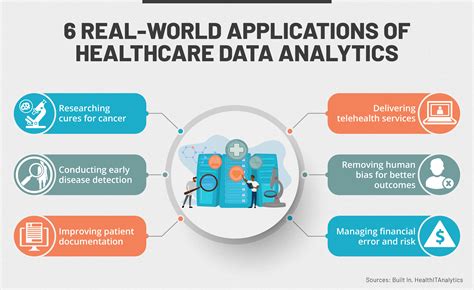

7 Profound Benefits of Data Analytics in Healthcare by 2025
Data analytics has emerged as a transformative force in healthcare, revolutionizing the way medical data is analyzed and used to improve patient care. By 2025, the global healthcare data analytics market is projected to reach a staggering $125 billion, driven by the increasing adoption of electronic health records (EHRs) and the growing need to optimize healthcare delivery.

1. Enhanced Patient Care and Outcomes
Data analytics empowers healthcare providers with valuable insights into patient health and treatment patterns. By analyzing patient data, they can identify risk factors, personalize treatments, and predict outcomes more accurately. This leads to improved patient care, reduced complications, and enhanced overall health outcomes.
2. Cost Reduction and Efficiency
Healthcare analytics helps identify inefficiencies and areas of waste in healthcare spending. By analyzing data on patient utilization, treatment costs, and insurance payments, healthcare organizations can optimize resource allocation, reduce unnecessary expenses, and improve operational efficiency.
3. Improved Disease Prevention and Detection
Data analytics enables healthcare professionals to identify patterns and trends in disease prevalence and risk factors. This information can be used to develop early detection systems, implement preventive measures, and target specific populations for health screening programs.
4. Personalized Medicine and Precision Healthcare
Data analytics allows for the analysis of individual patient data, including genetics, lifestyle, and environmental factors. This information can be used to tailor treatments and interventions to the specific needs of each patient, leading to more effective and personalized healthcare.
5. Enhanced Clinical Research and Innovation
Data analytics plays a crucial role in clinical research by providing researchers with access to vast amounts of patient data. This data can be used to identify new treatment strategies, test the effectiveness of drugs and devices, and advance medical knowledge.
6. Improved Patient Engagement and Satisfaction
Data analytics can be used to track patient feedback, identify areas of dissatisfaction, and develop strategies to enhance patient engagement. By understanding patient preferences and needs, healthcare providers can improve communication, enhance the quality of care, and build stronger patient relationships.
7. Optimized Decision-Making and Resource Allocation
Healthcare analytics provides decision-makers with data-driven insights to make informed decisions about resource allocation, investment strategies, and healthcare policies. By analyzing data on patient trends, population health, and healthcare costs, they can identify areas of need and prioritize funding to ensure optimal healthcare delivery.
Table 1: Key Benefits of Data Analytics in Healthcare
| Benefit | Description |
|---|---|
| Enhanced Patient Care | Improved patient outcomes, reduced complications |
| Cost Reduction | Optimized resource allocation, reduced waste |
| Disease Prevention | Early detection, preventive measures, targeted screening |
| Personalized Medicine | Tailored treatments based on individual patient data |
| Clinical Research | Accelerated drug development, advanced medical knowledge |
| Patient Engagement | Improved communication, enhanced quality of care |
| Decision-Making | Data-driven insights for resource allocation and healthcare policies |
Strategies for Effective Healthcare Data Analytics
- Invest in Data Infrastructure: Establish a robust data infrastructure to collect, store, and analyze patient data effectively.
- Embrace Collaboration: Foster collaboration between healthcare professionals, data analysts, and IT experts to leverage diverse perspectives and expertise.
- Use Artificial Intelligence (AI): Implement AI algorithms to automate data analysis and generate insights from complex datasets.
- Focus on Data Governance: Establish clear data governance policies to ensure data quality, security, and ethical use.
- Educate and Train Staff: Train healthcare providers and staff on data analytics principles and the use of analytical tools.
Future Trends in Data Analytics in Healthcare
- Wearable Devices and IoT: Increasing use of wearables and IoT devices to generate real-time patient data.
- Big Data Analytics: Analysis of massive datasets to identify patterns and trends not visible in smaller datasets.
- Cloud-Based Analytics: Adoption of cloud platforms for cost-effective data storage, analysis, and collaboration.
- Artificial Intelligence (AI): Expanded use of AI-powered tools for predictive analytics, personalized healthcare, and automated decision-making.
Conclusion
Data analytics is revolutionizing healthcare by providing unprecedented insights into patient care, disease prevention, and resource allocation. By leveraging the power of data, healthcare organizations can enhance patient outcomes, reduce costs, improve efficiency, and drive innovation. As the healthcare industry continues to evolve, data analytics will become an even more indispensable tool for optimizing healthcare delivery and improving the lives of patients worldwide.










